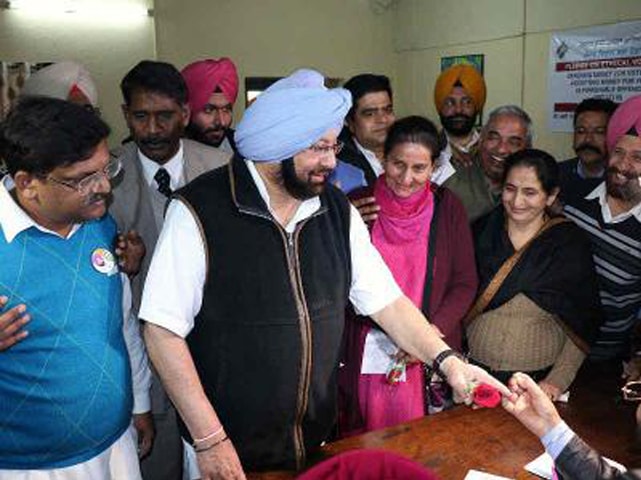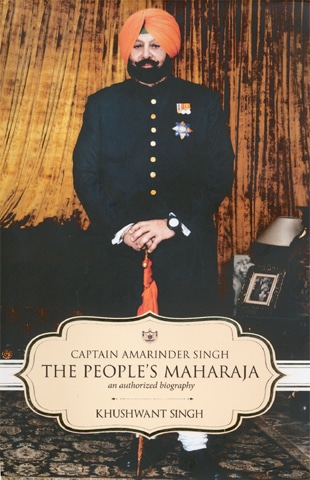
“I hope we didn’t shoot at each other during the 1965 war,” was the unexpected opening remark made by General Pervez Musharraf when Amarinder Singh called upon the president of Pakistan in Islamabad on March 15, 2005.
“Not at all. I’ve done some background checks on you. You were in the 1 SP (self propelled) Regiment in the Sialkot sector (in north-eastern Punjab, Pakistan, close to the Indo-Pak border) and I was ADC to Lieutenant General Harbakhsh Singh (based in Chandigarh). But you do owe my brother-in-law, Major Kanwaljit Singh Dhillon, a leg.”
“What did I do?”
“It was your shooting ... that knocked off his leg.”
After that, there was a peal of laughter in the room when Captain Amarinder Singh reminded Gen Musharraf that he was senior to him in service: “Sir, your commission date is April 1964 and mine is June 1963, making me nine months your senior.”
Reprinted with permission from Hay House, from the chapter ‘Soldier to Soldier: Meeting with President Pervez Musharraf’.
Gifted with a great sense of humour, Amarinder Singh has used this virtue several times, in tense situations, to break the ice, to eliminate deadlocks, to foster new friendships and to revive old ones.
When interacting with Gen Musharraf, once a cordial tone and tenor had been set and both were talking as one army man to another, Amarinder Singh took out a list of names. Handing the list over to President Musharraf, he said: “Sir, before we move forward, I would appreciate it if you would consider this list. They are the names of my people who are languishing in Pakistani jails. Many of them have completed their jail terms and are still being incarcerated. I would greatly appreciate it if you could do something to help them.”
Mostly victims of illegal immigration rackets, they had landed in Pakistani jails after getting stuck in Turkey en route to Europe. Turkish border authorities, after nabbing them, usually pushed them into Iran, which, in turn, pushed them into Pakistan. Gen Musharraf took prompt note of the request and asked Amarinder when he was set to return. On being told the day after tomorrow, the president, in an unprecedented move, called his chief of staff and asked him to ensure that these people went back with the chief minister. He ordered the immediate release of 83 prisoners who had completed their jail terms and ensured that they crossed the border along with Amarinder Singh. After that surprise announcement, Amarinder’s principal secretary, Suresh Kumar, Pakistan’s home secretary and the staff of the Indian High Commission in Islamabad went into overdrive to finish the mandatory paperwork. They (off the record) even visited Lahore’s Kot Lakhpat Jail to complete a few formalities.
President Musharraf went a step further and promised to release 150 more prisoners hailing from Indian Punjab in addition to 550 fishermen lodged in Pakistan jails whose nationality had been confirmed. The effort of bringing back prisoners raised Amarinder’s stature further in Punjab, especially amongst the families of those who had been set free. This particular benevolent act had its roots embedded in his ancestry.
Like one of his forefathers, Amar Singh, who, in the late 18th century, had used largesse offered by the king to pay the ransom for captives taken by the Delhi Durbar in the neighbourhood of Mathura and Saharanpur (mentioned in an earlier chapter), Amarinder Singh, too, used his good offices to get released Punjabi men and boys stuck in Pakistani jails. This humanitarian act earned Amarinder Singh tremendous goodwill and etched his name in history as families hugged their loved ones on their return home.
“It was indeed very magnanimous of President Musharraf to order their release immediately. And he took the decision in a moment, without any fuss, which speaks volumes of his leadership qualities,” says Amarinder.
Amarinder Singh, who had the mandate of Prime Minister Manmohan Singh, conveyed to President Musharraf the intent of the Indian government to develop and sustain long-term peaceful ties with its neighbour. The two dignitaries then discussed the thorny Kashmir issue and ways to move forward. According to Amarinder: “I asked him that since we were talking soldier to soldier, what would he do when it came to handling insurmountable problems? The answer is simple, that you leave them aside temporarily and move on with life. For example, as young officers what did we learn? We were told if there was a hump, keep it engaged and go by the flank and take it or bypass it if need be. In the bigger picture, if Kashmir is a block, leave it and let’s get on with each other to resolve other issues. Once the efforts start to yield results and we build trust, faith and love, Kashmir can then be dealt with.”

A meeting that had started with light-hearted banter and with a reference to the battlefield, something a true-blue diplomat would scoff at, and ended by setting the stage for larger and more meaningful dialogue, left a lasting impression on President Musharraf who had this to say about his guest from India.
“I found Captain Amarinder Singh a visionary leader who, as chief minister of Indian Punjab, put in a vigorous effort in bringing peace between Pakistan and India when I was president of Pakistan. A sane voice of reason, which was singularly focused on bringing the two Punjabs closer together through enhanced trade, added connectivity, religious tourism, sports and regular people-to-people contact. His successful visit to Pakistan in 2005 and his interactions with our officials helped in easing tensions further between the two countries at the time. On his request, I even ordered the release of a sizable number of Indian detainees from our prisons. A former soldier who served his country with distinction and a scion of a distinguished royal family, Captain Amarinder Singh seemed to be a compassionate man devoted to serving his constituents with strength and humility. My best wishes to him.”
In another high profile meeting in Islamabad, Amarinder Singh interacted with Pakistan Prime Minister Shaukat Aziz and discussed a range of important issues. Later, he addressed a group of Pakistani journalists.
Amarinder Singh created history when he spoke at Gurdwara Nankana Sahib while laying the foundation stone of the Baba Guru Nanak dual carriageway. When completed, buses could ply between Amritsar and Nankana Sahib. Describing the occasion as historic, Amarinder Singh said: “It had fulfilled the wish of the Sikhs, who in their daily ardas [prayer] used to pray for khule darshan didare [audience without hindrance] of Sikh religious places.” He became the first post-Partition Indian political leader to address a joint rally on Pakistani soil. The venue was filled with a sea of people listening intently to him. “It was a sight you do not get to see every day,” stated Asit Jolly, a senior journalist who was part of the chief minister’s delegation.
With regard to his trip to Pakistan, it can be safely concluded that Amarinder Singh’s appeal and charm had spread far and wide in that country and he had won many hearts.
Captain Amarinder Singh, The People’s Maharaja: An Authorised Biography
By Khushwant Singh
Hay House, India
ISBN: 978-93858273
392pp.
Published in Dawn, Books & Authors, March 26th, 2017
















































Dear visitor, the comments section is undergoing an overhaul and will return soon.